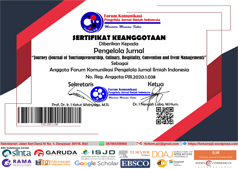Innovation Of Orange Into Candy In Batu Kaang Village, Kintamani, Bali
Abstract
Batukaang Village in Kintamani, Bali, is renowned for its high-quality Kintamani oranges (citrus reticulata), known for their unique aroma and flavor. However, marketing efforts largely focus on fresh fruit, resulting in underutilization of surplus or downgraded oranges rejected for size, shape, or color. This surplus, especially during peak harvests, leads to price drops and reduced farmer income. This study addresses the issue by developing a value-added product, Kintamani orange jelly candy as an innovative souvenir aligned with Bali's culinary tourism. Using a qualitative descriptive method and simple experimental design, three gelling agents (seaweed agar, cornstarch, and commercial jelly powder) were tested to find the best formulation for taste and texture. Sensory evaluation by 70 untrained panelists measured preferences across seven attributes: chewy and soft texture, taste, aroma, color, shape, and aftertaste, using a five-point hedonic scale. Product C, made with commercial jelly powder, was most preferred for its soft, chewy texture and pleasant flavor and aroma, though improvements in shape and color were needed. Product A received moderate acceptance, while Product B rated lowest in all categories, indicating a need for reformulation. The findings highlight the potential of Kintamani orange jelly candy as a strategy to reduce fruit waste and enhance the economic value of local produce. It also offers a promising new culinary souvenir to promote Batukaang Village within Bali’s tourism sector. Further research is recommended to refine formulations, broaden market reach, and evaluate commercial feasibility on a larger scale.
Copyright (c) 2025 Billy Tanius, Heru Pramudia, Iwan Surjawan

This work is licensed under a Creative Commons Attribution 4.0 International License.
















